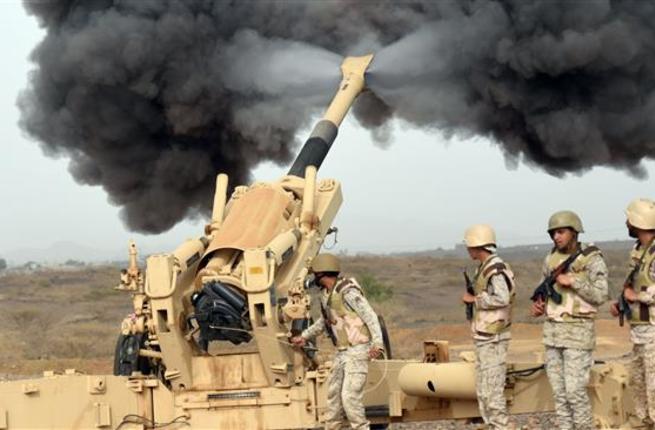The United States (US) has secretly had at least a dozen Green Beret troops on the ground in Saudi Arabia, near the border with Yemen, since the end of 2017. This comes as something of a surprise given the Pentagon’s repeated statements stressing that American military involvement in the conflict in Yemen was solely limited to “aircraft refueling, logistics and general intelligence sharing”. In response to this new information, Representative Mark Pocan (D-WI) expressed his frustration in a tweet saying, “For over a year, my questions on the US-Saudi war in Yemen went unanswered. Now we learn that the Pentagon hid on-the-ground Army involvement from Senators as they voted on ending the conflict. Congress must stop this secret, unconstitutional war”.
The Green Berets are the United States Army’s Special Forces unit, and their missions primarily include unconventional warfare, foreign internal defense, direct action, special reconnaissance, and counter terrorism. According to United States officials and European diplomats, as reported by the New York Times, the Special Forces in Saudi Arabia have been locating and destroying caches of ballistic missiles and launch sites that Houthi rebels in Yemen are using to attack Riyadh and other Saudi cities. Their use in this fashion – in a transition from logistical support to ‘boots on the ground’ – shows an escalation of American involvement in the conflict between the Saudi-led coalition and Iran-backed Houthi rebels in Yemen.
Before the public was made aware of US forces on Saudi Arabian soil, the United States government was still showing its support of the Saudi-coalition through arms sales and other military support. On 22 March 2018, the US State Department approved a possible Foreign Military Sale to Saudi Arabia of TOW 2B (BGM-71F-Series) missiles for an estimated cost of $670 million. The same day, a possible Foreign Military Sale of equipment and services for the continuation of the Maintenance Support Services (MSS) contract that supports the Royal Saudi Land Forces Aviation Command for an estimated cost of $106.8 million was also approved.
Throughout the course of the ongoing war in Yemen, the death toll has surpassed 10,000 – with over half being civilian casualties. Overall, Saudi Arabia and its coalition allies are responsible for a majority of the 5,000 civilian deaths in Yemen, largely through their campaign of air strikes, but also because of the effects of the crippling naval blockade. The US State Department continues to try and justify support for the coalition, even as human rights groups and other organizations have declared Saudi actions in Yemen to be potential war crimes. According to a fact sheet the State Department published regarding US security cooperation with Saudi Arabia, “the Saudi-led coalition is supporting the legitimate Yemeni government and defending its territory from an incursion by Houthi rebels. The United States continues to work with the Saudi-led Coalition in an effort to reduce and minimize civilian casualties in this conflict.”
Not everyone agrees with or supports the Unites States’ involvement in the conflict in Yemen, and some have raised concerns about the validity of the explanations given by the administration to justify continued involvement. Among those who are unconvinced is Senator Chris Murphy (D-CN), who sponsored a resolution along with Senator Mike Lee (R-UT) and Senator Bernie Sanders (I-VT) that would have withdrawn American support for Saudi Arabia’s military intervention in Yemen if it had passed. “There is a humanitarian catastrophe inside [Yemen] – that very few people in this nation can locate on a map – of absolutely epic proportion,” said Murphy. “This humanitarian catastrophe – this famine … is caused, in part, by the actions of the United States of America.”
When the resolution was originally proposed, US Defense Secretary, Jim Mattis, wrote a letter defending US military support to the Saudi Arabian-led coalition forces in Yemen. He said, “New restrictions on this limited US military support could increase civilian casualties, jeopardize cooperation with our partners on counter-terrorism and reduce our influence with the Saudis – all of which would further exacerbate the situation and humanitarian crisis.” This narrative is false. As Senator Murphy stated in 2017, “It is the US refueling planes flying in the sky around Yemen that restock the Saudi fighter jets with fuel, allowing them to drop more ordnance. It is US-made ordnance that is carried on these planes and dropped on civilian and infrastructure targets inside Yemen. The United States is part of this coalition. The bombing campaign that has caused the cholera outbreak could not happen without us.” Murphy argues that the United States would actually save civilian lives in Yemen if they were to pull their support for the coalition.
The Unites States isn’t the only country who has been complicit in Saudi Arabia’s actions in Yemen. The United Kingdom and France also have continued to support the Saudi-coalition. In March 2018, Britain’s biggest arms manufacturer, BAE Systems, moved towards completing an order worth billions of pounds from Saudi Arabia for the purchase of 48 Typhoon fighter jets. French president, Emmanuel Macron has also defended weapons sales to the coalition. On the other hand, some countries have decided the humanitarian crisis in Yemen, and the civilian casualties resulting from the involvement of the Saudi-coalition, are reason enough to halt arms sales. In January 2018, Norway suspended exports of weapons and ammunition to the United Arab Emirates – who were helping to aid the Saudi-coalition – and Germany soon followed suit, stopping all arms exports to countries involved in the ongoing conflict in Yemen.
The US, UK, and France must take the situation in Yemen seriously and look to Norway and Germany as examples. Only with sustained international pressure will Saudi Arabia halt its attacks on civilians – and this includes the suspension of arms sales by the US, UK, and France. International actors also must call on Saudi Arabia to end their airstrike campaign on Yemen permanently and press the kingdom to quickly reach a political solution to the conflict.
Monica Zuraw is an Advocacy Fellow at ADHRB





